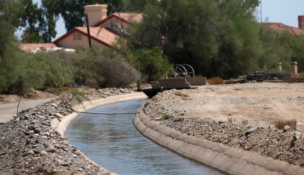AZ lawmakers agree: Stop investment in Sudan
Arizona Capitol Reports Staff//February 15, 2008//[read_meter]
AZ lawmakers agree: Stop investment in Sudan
Arizona Capitol Reports Staff//February 15, 2008//[read_meter]
Arizona’s lawmakers are poised to pass a measure to compel the state’s treasurer and retirement systems to divest from companies that do business in Sudan, a strategy meant to put economic pressure on the Sudanese government in the hopes of ultimately ending genocide there.
And, perhaps surprisingly, all 90 state lawmakers signed on to sponsor or co-sponsor the pair of bills, virtually assuring they will pass unanimously when voted on by the House and Senate.
The bills target companies already identified by the federal government that provide goods and services to the Sudanese government. They represent a shift in attitude toward companies that do business in Sudan and are therefore viewed as materially aiding a government that is accused of arming the Janjaweed militias blamed for the killings in Darfur. Some estimates place the death toll at more than 400,000.
22 states, Feds OK strategy
Already, 22 states and the federal government have passed Sudan divestment legislation, and by year’s end, that number could increase to nearly 30 states.
Phoenix Democrat Rep. Kyrsten Sinema, a prime sponsor of the House bill, has made it a priority this year to halt state investment in Sudan.
“I knew that everyone cared about the genocide in Sudan,” she said, “and thought it would be unfair to leave people out if they wanted to be a part of Arizona’s work to do its part to stop the genocide.”
Her bill, H2705, was approved Feb. 12 by the House Public Institutions and Retirement Committee. Likewise, an identical bill in the Senate was approved Feb. 13 by that chamber’s Commerce and Economic Development Committee, the first steps of the bills’ journeys to the governor’s desk.
Under the proposal, Arizona’s retirement system would no longer be permitted to invest in companies connected to the government of Sudan as an attempt to pressure the Sudanese government into stopping what some human rights advocates are calling genocide in the country’s Darfur region.
Also, those companies cannot receive state contracts for goods or services.
After hearing the stories of death and survival by Sudanese refugees now living in Arizona, a Senate panel approved S1366 unanimously. The stories had conveyed a sense of urgency for the legislation.
Sen. Barbara Leff, chairwoman of the Senate Commerce and Development Committee, most eloquently summed up the argument for the proposal.
“After the Holocaust, the world said, ‘Never again,’” the Paradise Valley Republican said. “But that’s not true. It’s still happening. And I will never understand man’s inhumanity to man.”
She added: “Hopefully the world will keep speaking and saying, ‘Never again,’ and try to do something about it until it actually happens — that it is never again. Unfortunately, society is not there yet. But maybe someday, God willing, it will be.”
Moved to tears
Sen. Paula Aboud of Tucson, the primary sponsor in the Senate, said the Sudanese’s testimonies and her colleagues’ responses moved her to tears.
“I don’t know that I’ll ever be the same,” she said. “This is the most personal hearing I’ve ever been a participant of.”
Aboud said there are approximately 14 companies from which Arizona will have to pull investments.
“If they changed their business practice, we don’t divest. If they don’t change their business practice, we divest,” she said.
Sinema said the idea for the legislation came from the Sudan Divestment Task Force, a national nonprofit group that has been pushing governments to impose informal economic sanctions on Sudan by refusing to invest in the companies that aid its government. She said Sudanese leaders have shown in the past they will capitulate under economic pressure, citing sanctions in the 1990s that led the government to help root out terrorists living there.
“The government of Sudan really responds well to outright pressure,” she said.
Idris Abdulmullah was one of the Sudanese refugees who pleaded with lawmakers to take an interest in the tumultuous region. He told both legislative panels how Janjaweed militias attacked his village in 1988, destroying it and leaving 40 people dead.
“I’m very glad to hear it,” Abdulmullah said after the proposal passed in committee.
Sen. Meg Burton Cahill, D-17, explained why she supports the measure by saying she lives by the phrase, “Think globally, act locally.”
“There are days down here that are very special, and they are the days when in one fell swoop we can move Arizona forward and we can truly be acting locally but thinking very, very globally,” she said.
Phoenix Sen. Ken Cheuvront, a Democrat, who has spent time in Africa, said he “hopes that this century will see less ethnic conflict and the ability for prosperity to happen.”
Republican Sen. Robert Blendu of Litchfield Park noted the tragedy in Sudan is happening elsewhere. The hearing is also a reminder of the kind of freedom enjoyed in the United States.
“None of us has to go home today and worry about someone coming into our house and shooting us because of our political beliefs,” he said.
He told the Sudanese survivors that in the U.S., they are free not only to speak against their country, but also against the U.S. government.
“All of us stand up for those principles and we fight to preserve them,” he said.
Enthusiasm evident
Aboud said the enthusiasm for the measure was evident when she asked colleagues to sign as co-sponsors. One, she said, grabbed the proposal out of her hand.
“She couldn’t sign it fast enough,” Aboud recounted.
It’s rare for a bill to carry all members of a body as co-sponsors, lawmakers said. Senate Majority Whip John Huppenthal said the last time he had seen it was in 1993, on a bill he introduced on teacher performance pay. Senate Minority Leader Marsha Arzberger said she could recall getting all or nearly all members as co-sponsors for some of her measures in the past. She said that kind of solidarity also is a matter of time and availability — that is, whether a sponsor has enough time to gather signatures and the members are available to do it. Sen. Ron Gould, R-3, said it’s easier to get all members to sign onto a memorial, since it does not have the effect of law. But Darfur, he said, is certainly a big issue.
Sinema said the outpouring of support is something she will hold up as exemplifying the things that unite people, regardless of the political clashes that occur on other issues.
“It certainly makes me feel better about my job,” she said. “The past four years as an elected official are worth it to do the Sudan divestment bill.”
Under the proposal, funds managed by the state treasurer, the Arizona State Retirement System, the Public Safety Personnel Retirement System, the Elected Officials’ Retirement Plan, and the Correction Officer Retirement Plan must identify companies in their investment portfolios that have operations in Sudan.
Any company actively engaged in business in Sudan will be sent a letter saying Arizona’s retirement systems will divest its funds unless they stop operations in Sudan.
If, after 180 days the company still has operations in Sudan, then Arizona will divest itself of the company’s securities under a timetable stipulated in the proposal. ?
















